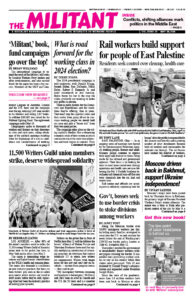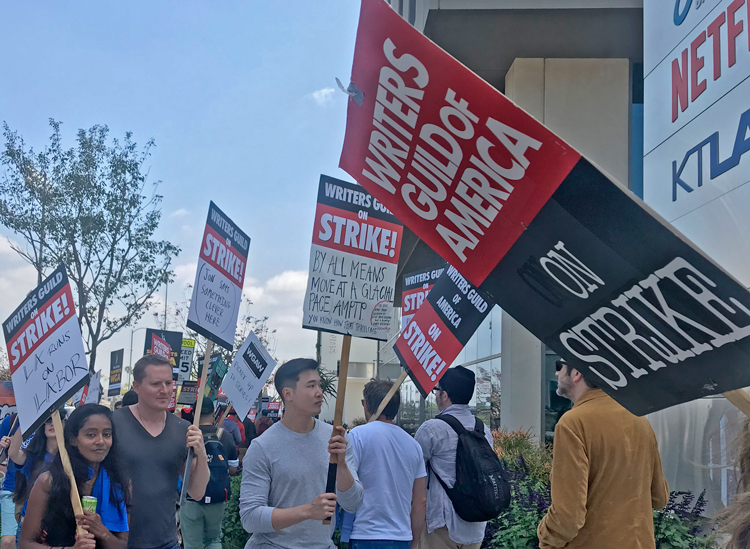LOS ANGELES — After 98% of the union’s members voted to strike, the 11,500-strong Writers Guild of America union took to the picket line here, in New York and in other cities May 2.
The union is demanding wage increases and higher bosses’ contributions to the WGA’s health and pension plans. The union also demands a crackdown on new industry practices that have cut back writers’ pay, such as the so-called mini-rooms where writers are hired to draft shows before they’re sold, replacing what had been the industry practice of making pilot episodes.
Strikers on the picket line in front of Netflix here May 11 told the Militant the bosses’ Alliance of Motion Picture and Television Producers have used the rapidly multiplying introduction of streaming programs on television that replace broadcast TV to attack how writers are compensated. Writers work longer hours for less pay and can’t rely on residuals — income from program reruns — they used to get.
“Pay discrepancy between streaming and broadcast is humongous,” Eli Henry said. He’s been an actor in Canada and the U.S. for 20 years and is a member of the Screen Actors Guild-American Federation of Television and Radio Artists, as well as the Canadian television and radio artists union. He joined with hundreds of writers and supporters marching that day.
“We all want the same things — respect, fair pay and to be treated with dignity,” he said.
Several young writers who have only worked a year or two in the industry were picketing that day, but aren’t yet in the union. One WGA member who has worked since 2016 didn’t want to give his name for fear of boss retribution. He said the mini-rooms previously hired eight to 10 writers for five months or so to write a show. Now, he said, often four writers are expected to do the same work in half that time.
Producers don’t want to pay writers to be involved in production or postproduction because they get paid more when on the set.
After inflation, pay for a screenwriter declined 14% in the last five years, the union says. “Ninety-nine percent of us barely make our rent,” he said.
Hollywood studios, and companies like Netflix, Warner Bros. Discovery and Disney have laid off thousands of workers.
The companies have created a “gig economy inside a union workforce,” the Writers Guild said. Several pickets told the Militant most workers in the entertainment industry work job to job, which gives bosses a lot of leverage. Only a minority of writers, directors and actors make a livable income or work the hours they need, and most have other jobs to make ends meet.
The contracts members of the Directors Guild of America, with 19,000 members, and Screen Actors Guild, with 160,000, have with the Alliance of Motion Picture and Television Producers expire June 30.
Margaret Lebron has been member of the WGA for one year and of IATSE, the International Alliance of Theatrical Stage Employees, before that. “You have to get hired for a studio production covered by the WGA contract to get into the union,” she said, “and it’s hard to get an interview for those jobs.”
Strikers have gotten a lot of support on their picket lines, she said, from “SAG-AFTRA, IATSE, the musicians’ unions, Teamsters, teachers in the United Teachers Los Angeles, and the Directors Guild. We get lots of honks from those who drive by. The picket line is open to everyone, we encourage support.”
For picket line schedules and locations in New York and Los Angeles go to wga.org. The Central Labor Council in New York also posts picket locations and times regularly.


